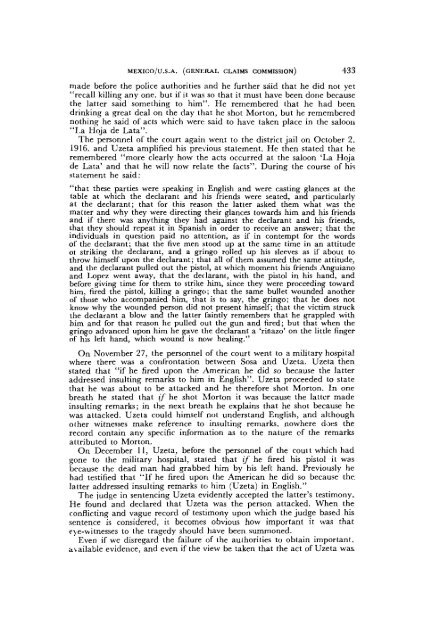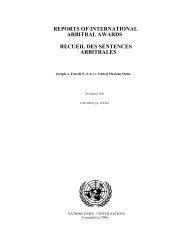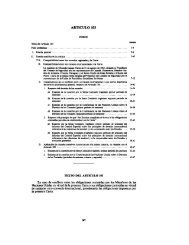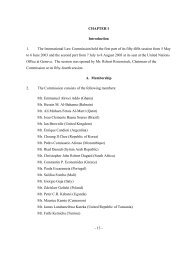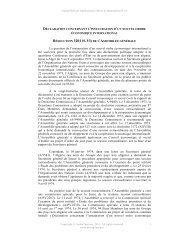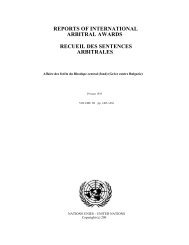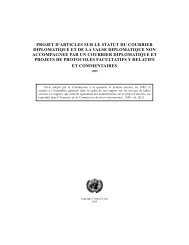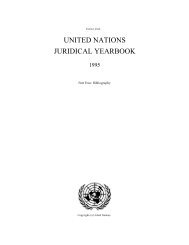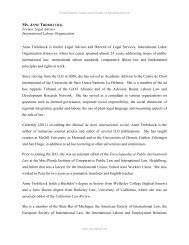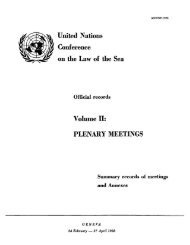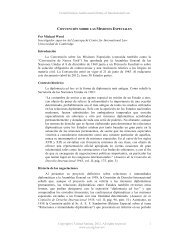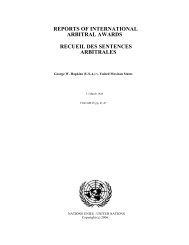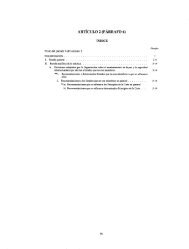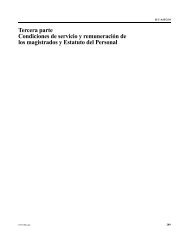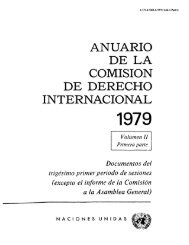428-435 - United Nations Treaty Collection
428-435 - United Nations Treaty Collection
428-435 - United Nations Treaty Collection
Create successful ePaper yourself
Turn your PDF publications into a flip-book with our unique Google optimized e-Paper software.
MEXICO/U.S.A. (GENERAL CLAIMS COMMISSION) 433<br />
made before the police authorities and he further said that he did not yet<br />
"recall killing any one, but if it was so that it must have been done because<br />
the latter said something to him". He remembered that he had been<br />
drinking a great deal on the day that he shot Morton, but he remembered<br />
nothing he said of acts which wen: said to have taken place in the saloon<br />
"La Hoja de Lata".<br />
The personnel of the court again went to the district jail on October 2,<br />
1916, and Uzeta amplified his previous statement. He then stated that he<br />
remembered "more clearly how the acts occurred at the saloon 'La Hoja<br />
de Lata' and that he will now relate the facts". During the course of his<br />
statement he said:<br />
"that these parties were speaking in English and were casting glances at the<br />
table at which the declarant and his friends were seated, and particularly<br />
at the declarant; that for this reason the latter asked them what was the<br />
matter and why they were directing their glances towards him and his friends<br />
and if there was anything they had against the declarant and his friends,<br />
that they should repeat it in Spanish in order to receive an answer; that the<br />
individuals in question paid no attention, as if in contempt for the words<br />
of the declarant; that the five men stood up at the same time in an attitude<br />
ot striking the declarant, and a gringo rolled up his sleeves as if about to<br />
throw himself upon the declarant; that all of them assumed the same attitude,<br />
and the declarant pulled out the pistol, at which moment his friends Anguiano<br />
and Lopez went away, that the declarant, with the pistol in his hand, and<br />
before giving time for them to strike him, since they were proceeding toward<br />
him, fired the pistol, killing a gringo; that the same bullet wounded another<br />
of those who accompanied him, that is to say, the gringo; that he does not<br />
know why the wounded person did not present himself; that the victim struck<br />
the declarant a blow and the latter faintly remembers that he grappled with<br />
him and for that reason he pulled out the gun and fired; but that when the<br />
gringo advanced upon him he gave the declarant a 'rinazo' on the little finger<br />
of his left hand, which wound is now healing."<br />
On November 27, the personnel of the court went to a military hospital<br />
where there was a confrontation between Sosa and Uzeta. Uzeta then<br />
stated that "if he fired upon the American he did so because the latter<br />
addressed insulting remarks to him in English". Uzeta proceeded to state<br />
that he was about to be attacked and he therefore shot Morton. In one<br />
breath he stated that if he shot Morton it was because the latter made<br />
insulting remarks; in trie next breath he explains that he shot because he<br />
was attacked. Uzeta could himself not understand English, and although<br />
other witnesses make reference to insulting remarks, nowhere docs the<br />
record contain any specific information as to the nature of the remarks<br />
attributed to Morton.<br />
On December 11, Uzeta, before the personnel of the couit which had<br />
gone to the military hospital, staled that if he fired his pistol it was<br />
because the dead man had grabbed him by his left hand. Previously he<br />
had testified that "If he fired upon the American he did so because the.<br />
latter addressed insulting remarks to him (Uzeta) in English."<br />
The judge in sentencing Uzeta evidently accepted the latter's testimony.<br />
He found and declared that Uzeta was the person attacked. When the<br />
conflicting and vague record of testimony upon which the judge based his<br />
sentence is considered, it becomes obvious how important it was that<br />
eye-witnesses to the tragedy should have been summoned.<br />
Even if we disregard the failure of the aulhorities to obtain important,<br />
available evidence, and even if the view be taken that the act of Uzeta was.


